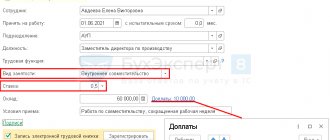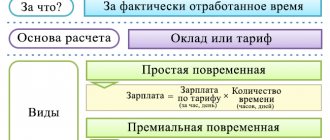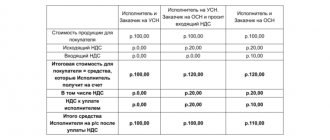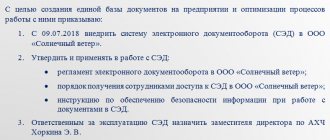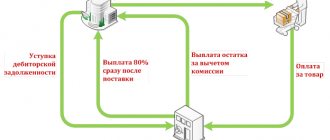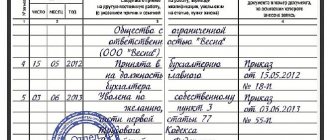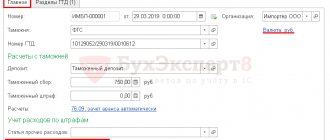But even despite the existence of a separate chapter. 48.1 of the Labor Code and the standard form of an employment contract, which essentially exempts microbusinesses from a number of local regulations, many practical difficulties arise. Because a business, regardless of its organizational and legal form, be it an individual entrepreneur or an LLC, if it has employees, must keep personnel records.
In this article we will look at the following issues:
- Microenterprise criteria in 2022
- Personnel records for micro-enterprises
- Standard form of an employment contract
- How to enter simplified personnel records
- Loss of the right to simplified personnel records
- How to keep a work book for a micro-enterprise
- How to store personnel documents
- What personnel documents does a micro-enterprise need to maintain?
Microenterprise criteria in 2022
The concept of a microenterprise was introduced by Federal Law No. 209-FZ of July 24, 2007. This can be either an individual entrepreneur or a legal entity.
Information about them is included in the Unified Register of Small and Medium-Sized Enterprises.
There are several criteria that define a microenterprise:
- the average number of employees for the previous calendar year is no more than 15 people;
- maximum income from business activities is 120 million rubles. (the limit value is established by Decree of the Government of the Russian Federation dated April 4, 2016 No. 265);
- the total share of participation in the authorized capital of the Russian Federation, constituent entities of the Russian Federation, municipalities, public and religious organizations (associations), charitable and other foundations is 25%;
- the total share of participation in the authorized capital of foreign legal entities and (or) legal entities that are not SMEs is 49%.
Micro-enterprise personnel records
Just like in all other organizations, personnel records management of a micro-enterprise requires the correct and consistent execution of documents. First of all, you need to follow the rules of admission and dismissal.
Hiring: top 10 common mistakes made by employers
Since 2022, personnel document flow for micro-enterprises has been simplified due to the entry into force of Federal Law No. 348-FZ dated July 3, 2016.
A micro-enterprise, being an employer, has the right to refuse, in whole or in part, the adoption of local regulations containing labor law norms, namely:
- from internal labor regulations;
- from the wage regulations;
- from the bonus regulations;
- from the shift schedule and many others.
In fact, this list of local regulations is open. Refusal of them is a right, not an obligation of micro-enterprises.
At the same time, when concluding employment contracts with employees, a microenterprise is obliged to include in the terms and conditions all issues that are regulated by local regulations.
To simplify work with documents and formulate conditions, the Government of the Russian Federation Decree No. 858 dated August 27, 2016 approved a standard form of an employment contract, as well as the procedure for its execution.
Small business, micro-enterprises and their great features
You will learn:
- What nuances of drawing up local regulations and employment contracts has the legislator established for micro-enterprises?
- How these employers can lose the right to simplified personnel document flow
- What benefits do small businesses have under administrative sanctions?
HR DOCUMENT FLOW IN MICROENTERPRISES
07/03/2016 The President of Russia signed Federal Law No. 348-FZ “On amendments to the Labor Code of the Russian Federation regarding the specifics of regulating the labor of persons working for employers - small businesses that are classified as micro-enterprises”[1] (hereinafter referred to as Federal Law No. 348-FZ).
Now a new chapter 48.1 has appeared in the Labor Code of the Russian Federation (or, rather, a small chapter consisting of only two articles - 309.1 and 309.2). However, this small chapter changes a lot for microenterprises (hereinafter referred to as microenterprises), greatly simplifying their personnel records management and personnel document flow.
Initially, it was proposed to simplify personnel document flow for both small and small enterprises. But in the end, a decision was made for small enterprises to leave everything as is, but in small enterprises, which employ no more than 15 people (and often less, and sometimes there is only one director or a director and an accountant), now there will be much less personnel documents , but the form and content of the employment contract will become significantly more complicated.
What has changed for micro-enterprises?
Article 309.1 of Federal Law No. 348-FZ establishes general provisions according to which:
- regulation of labor relations and other directly related relations in small enterprises is carried out taking into account the specifics established by Chapter 48.1 of the Labor Code of the Russian Federation;
- if the employer ceases to be an SE, information about this is entered into the unified register of small and medium-sized businesses (hereinafter referred to as the register);
- such an employer is given four months from the date of making the relevant changes to the register to switch to the standard procedure for maintaining personnel document flow.
Article 309.2 gives SE employers the right (but does not oblige them!) to completely or partially refuse to adopt local regulations (hereinafter referred to as LNA) containing labor law norms (internal labor regulations, regulations on remuneration, regulations on bonuses, shift schedules) and etc.).
If they decide to exercise this right, then instead of accepting the LNA, they will have to include in employment contracts with employees conditions regulating issues that, in accordance with labor legislation, should be regulated by the LNA.
Moreover, employment contracts in this case will have to be concluded in a standard form, which will be approved by the Government of the Russian Federation, taking into account the opinion of the Russian Tripartite Commission for the Regulation of Social and Labor Relations.
Of course, if there are really only 1-2-3 employees in an MP, then it is easier to make employment contracts according to a standard form.
If the employer-MP has all 15 (and even 10-12) employees, it is much more convenient to establish for them standards of work and behavior during working hours in a normative, rather than contractual way, individually within the framework of their powers granted by the Labor Code of the Russian Federation, approving the corresponding LNA, and, as necessary, also unilaterally making changes to these LNA.
Chapter 48.1 of the Labor Code of the Russian Federation will come into force 180 days after the official publication of Federal Law No. 348-FZ.
ADMINISTRATIVE WARNINGS FOR SMALL BUSINESSES
Federal Law No. 316-FZ of July 3, 2016 “On Amendments to the Code of the Russian Federation on Administrative Offences” [2] ® (hereinafter referred to as Federal Law No. 316-FZ) established the possibility of mitigating in certain cases administrative penalties for small businesses by replacing administrative fines and administrative warnings.
New Part 3 Art. 1.4 of the Code of Administrative Offenses of the Russian Federation establishes special conditions for the application of administrative liability measures for the commission of administrative offenses for:
- legal entities that are small and medium-sized businesses;
- managers and other employees of these legal entities who have committed administrative offenses in connection with the performance of organizational, administrative or administrative functions (hereinafter referred to as officials[3]);
- individual entrepreneurs who are small and medium-sized businesses.
These special conditions are disclosed - also in the new - Part 3 of Art. 3.4 of the Code of Administrative Offenses of the Russian Federation, according to which administrative punishment in the form of a warning can now be applied not only when it is provided for in the form of a sanction[4] of the corresponding article of the Code of Administrative Offenses of the Russian Federation (hereinafter referred to as the Code of Administrative Offenses of the Russian Federation, Code), but also in cases where An article of the Code itself or the law of a constituent entity of the Russian Federation on administrative offenses[5] provides not for a warning, but for a fine. From now on, administrative punishment in the form of an administrative fine can be replaced by a warning - both directly to legal entities and individual entrepreneurs who are small and medium-sized businesses, and to their officials. The following link follows: “in accordance with Article 4.1.1 of this Code.”
So what do we have in Art. 4.1.1 Code of Administrative Offenses of the Russian Federation? It was also introduced by Federal Law No. 316-FZ:
Extraction
from the Code of the Russian Federation on Administrative Offenses
Article 4.1.1. Replacement of administrative punishment in the form of an administrative fine with a warning
1. Those who are small and medium-sized businesses, persons engaged in business activities without forming a legal entity, and legal entities, as well as their employees, for the first time committed an administrative offense identified during the implementation of state control (supervision), municipal control, in cases where the appointment administrative punishment in the form of a warning is not provided for by the corresponding article of Section II of this Code or the law of a constituent entity of the Russian Federation on administrative offenses, administrative punishment in the form of an administrative fine is subject to replacement with a warning in the presence of circumstances provided for in Part 2 of Article 3.4 of this Code, with the exception of cases provided for in Part 2 of this article.
2. Administrative punishment in the form of an administrative fine cannot be replaced by a warning in the event of an administrative offense provided for in Articles 14.31–14.33, 19.3, 19.5, 19.5.1, 19.6, 19.8–19.8.2, 19.23, parts 2 and 3 of Article 19.27, Articles 19.28, 19.29, 19.30, 19.33 of this Code.
3. If an administrative penalty in the form of an administrative fine is replaced by a warning, the additional administrative penalty provided for by the relevant article of Section II of this Code or the law of a constituent entity of the Russian Federation on administrative offenses is not applied.
It is very pleasant to read part 1 of this article, which clarifies that if they replaced the fine with a warning not provided for in the sanction of the article of the Code of Administrative Offenses of the Russian Federation, then they replaced everything: both the main punishment (fine) and additional (additional punishments are included in Article 3.3 of the Code of Administrative Offenses of the Russian Federation, for example, confiscation of the instrument or subject of an administrative offense; deprivation of a special right in the form of the right to drive a vehicle of the appropriate type; administrative expulsion from the Russian Federation of a foreign citizen or stateless person; administrative ban on visiting the venues of official sports competitions on the days of their holding).
As we can see, replacing a fine with a warning is possible only if a set of four conditions is present:
- If a person (legal or individual) commits an offense for the first time (Part 1 of Article 4.1.1 of the Code of Administrative Offenses of the Russian Federation).
- In the absence of causing harm or a threat of harm to the life and health of people, objects of flora and fauna, the environment, cultural heritage sites (historical and cultural monuments) of the peoples of the Russian Federation, state security, threats of emergency situations of a natural and man-made nature (Part 1 Article 4.1.1, Part 2, Article 3.4 of the Code of Administrative Offenses of the Russian Federation);
- In the absence of property damage (part 1 of article 4.1.1, part 2 of article 3.4 of the Code of Administrative Offenses of the Russian Federation);
- In addition to the offenses provided for in the articles listed in Part 2 of Art. 4.1.1 Code of Administrative Offenses of the Russian Federation. In particular[6]:
Article 19.3 of the Code of Administrative Offenses of the Russian Federation “Disobedience to a lawful order of a police officer, military personnel, an employee of the federal security service, an employee of state security agencies, an employee of bodies exercising federal state control (supervision) in the field of migration , or an employee of a body or institution of the penal system”[7 ];
- Article 19.5 of the Code of Administrative Offenses of the Russian Federation “Failure to comply on time with a legal order (resolution, presentation, decision) of the body (official) exercising state supervision (control), municipal control”;
- Article 19.6 of the Code of Administrative Offenses of the Russian Federation “Failure to take measures to eliminate the causes and conditions that contributed to the commission of an administrative offense”;
- Article 19.23 of the Code of Administrative Offenses of the Russian Federation “Forgery of documents, stamps, seals or forms, their use, transfer or sale”;
- part 2 art. 19.27 of the Code of Administrative Offenses of the Russian Federation: submission of knowingly false information about a foreign citizen or a stateless person or false documents by the receiving party when carrying out migration registration;
- Article 19.28 of the Code of Administrative Offenses of the Russian Federation “Illegal remuneration on behalf of a legal entity”;
- Article 19.29 of the Code of Administrative Offenses of the Russian Federation “Illegal involvement in labor activities or in the performance of work or provision of services of a state or municipal employee or a former state or municipal employee”[8].
NOTE
We emphasize that a warning , like a fine, is an administrative penalty . Therefore, if an employer or official receives a warning, they are considered to have an administrative penalty . Accordingly, if they commit a new administrative offense, then the punishment for it will be the same as for a repeated one - more severe than for one committed for the first time.
Let's take hch as an example. 1 and 4 tbsp. 5.27 Code of Administrative Offenses of the Russian Federation[9] (“Violation of labor legislation and other regulatory legal acts containing labor law norms”):
Extraction
from the Code of the Russian Federation on Administrative Offenses
1. Violation of labor legislation and other regulatory legal acts containing labor law norms, unless otherwise provided by parts 2 and 3 of this article and article 5.27.1 of this Code, -
entails a warning or the imposition of an administrative fine on officials in the amount of one thousand to five thousand [10] rubles; for persons carrying out entrepreneurial activities without forming a legal entity - from one thousand to five thousand rubles; for legal entities - from thirty thousand to fifty thousand rubles.
[…]
4. Commitment of an administrative offense provided for by part 1 of this article by a person previously subjected to administrative punishment for a similar administrative offense -
shall entail the imposition of an administrative fine on officials in the amount of ten thousand to twenty thousand rubles or disqualification for a period of one to three years; for persons carrying out entrepreneurial activities without forming a legal entity - from ten thousand to twenty thousand rubles; for legal entities - from fifty thousand to seventy thousand rubles .
[…]
And parts 1 and 5 of Art. 5.27.1 Code of Administrative Offenses of the Russian Federation (“Violation of state regulatory requirements for labor protection contained in federal laws and other regulatory legal acts of the Russian Federation”):
Extraction
from the Code of the Russian Federation on Administrative Offenses
1. Violation of state regulatory requirements for labor protection contained in federal laws and other regulatory legal acts of the Russian Federation, with the exception of cases provided for in parts 2–4 of this article, -
entails a warning or the imposition of an administrative fine on officials in the amount of two thousand to five thousand rubles; for persons carrying out entrepreneurial activities without forming a legal entity - from two thousand to five thousand rubles; for legal entities - from fifty thousand to eighty thousand rubles.
[…]
5. Commitment of administrative offenses provided for in parts 1–4 of this article by a person previously subjected to administrative punishment for a similar administrative offense -
shall entail the imposition of an administrative fine on officials in the amount of thirty thousand to forty thousand rubles or disqualification for a period of one to three years ; for persons carrying out entrepreneurial activities without forming a legal entity - from thirty thousand to forty thousand rubles or administrative suspension of activities for a period of up to ninety days; for legal entities - from one hundred thousand to two hundred thousand rubles or administrative suspension of activities for a period of up to ninety days .
[…]
[1] Published on the Official Internet portal of legal information https://www.pravo.gov.ru 07/04/2016.
[2] Came into force on July 4, 2016 (published on the Official Internet Portal of Legal Information https://www.pravo.gov.ru on July 4, 2016).
[3] The Code of Administrative Offenses of the Russian Federation further refers to them as “employees,” however, employees who are not officials do not perform organizational, managerial or administrative functions and, accordingly, do not bear administrative responsibility. Therefore, we have preferred to use the term “officials” here.
[4] Articles (parts of articles) of codes such as administrative and criminal consist of dispositions and sanctions . The disposition contains the name or description of the offense (crime); the sanction establishes the type and amount of punishment.
[5] For example, Moscow City Law No. 45 of November 21, 2007 “Moscow City Code on Administrative Offences” (as amended on May 25, 2016).
[6] We selected only those that, in one way or another, may have at least some relation to the personnel service.
[7] Federal Law of July 3, 2016 N 305-FZ “On amendments to certain legislative acts of the Russian Federation in connection with the improvement of public administration in the field of control over the circulation of narcotic drugs, psychotropic substances and their precursors and in the field of migration” (entered into force effective 04.07.2016) from Art. 19.3 of the Code of Administrative Offenses excludes mention of employees of the authorities for control of the circulation of narcotic drugs and psychotropic substances.
[8] See art. 64.1 Labor Code of the Russian Federation.
[9] After 90 days after the official publication of the Federal Law of July 3, 2016 No. 272-FZ “On Amendments to Certain Legislative Acts of the Russian Federation on the Issues of Increasing the Responsibility of Employers for Violations of the Legislation Regarding Remuneration” (October 3, 2016 ) Article 5.27 will be presented in a new wording.
[10] Here and further in the extract it is emphasized by the author.
Standard form of an employment contract
The use of a standard employment contract is approved by local regulations. Thus, a micro-enterprise is required to apply a specific document that spells out the same conditions for all employees.
In the form that is proposed to be taken as a basis, all the necessary issues in the relations between the two parties are taken into account as much as possible:
- rights and obligations of the employee/employer;
- salary;
- employee working hours and rest time;
- occupational Safety and Health;
- social insurance and other guarantees;
- changing the terms of the employment contract.
It is not necessary to borrow the entire form. A micro-enterprise employer may retain only those terms and conditions that are appropriate to the nature of its work. This possibility is recorded in the Letter of the Ministry of Labor of the Russian Federation dated June 30, 2017 No. 14-1/B-591.
Please note that the standard form of employment contract has notes. They indicate which items are relevant to certain categories of workers. These items can also be excluded depending on the specific micro-enterprise.
Based on the signed employment contract, the employer issues an employment order. The employee must familiarize himself with this order and sign it.
When hiring, an employee provides the microenterprise with his personal data. They are necessary for the employer to comply with the requirements of labor, tax and accounting legislation.
Employee personal data: how to work with it
Since recently the rules governing the processing of personal data have become more stringent, it is important to formalize the employee’s consent to such processing.
How to organize it from scratch: step-by-step instructions
A HR employee always faces the difficult task of organizing this type of office work. To facilitate this process, it is important to first draw up a rough work plan and determine the sequence in which to act:
- The right decision would be to first study the regulatory documentation.
- Having studied it in detail, the immediate preparation of the document flow is carried out. All constituent documents are taken from the manager and studied in detail. All documentation must correspond to the constituent documents. It is important to ask the head of the company what additional conditions he wants to add to the work schedule. Based on his wishes, additional optional documents are drawn up.
- Creation of documentation: to begin with, the director is documenting;
- then the staffing table and internal labor regulations are drawn up;
- a form of employment contract is being developed, which is concluded with all employees. It includes all the items that the organization needs;
- other important papers and journals are being prepared;
- it is necessary to decide who will be responsible for work records. Until people are officially hired, the manager will be forced to hire them. Accordingly, an order is made to accept responsibility for the safety, completion and issuance of the work by the labor manager;
- after this, the official reception of workers begins.
After registration of employment, regular working days begin for the personnel officer. Every day, a time sheet is kept to record the time each person is present at work. A vacation schedule is drawn up once a year.
The personnel officer is obliged to document the movement of people in the enterprise, preparing the appropriate documentation. In addition, he must prepare many other papers.
How to enter simplified personnel records
The possibility of using reduced personnel records is a right, not an obligation of a microbusiness.
Before making a choice between a simplified option and accounting according to general rules, you need to assess the development prospects of the enterprise. If an expansion of staff or an increase in income is not expected, then you can safely opt for simplified accounting. To do this, it is necessary to issue an appropriate order. It will serve as confirmation that this organization has adopted simplified personnel records, which exempts it from a number of local regulations.
If you understand that in the near future you will go beyond the limits of a micro-enterprise, that is, the number of employees will exceed 15 people or the income will be more than 120 million rubles, then it is better to deal with personnel accounting according to the general rules. Otherwise, serious inconvenience will occur.
How to keep a work book for a micro-enterprise
At first, when the possibility of simplifying personnel document flow for micro-businesses was just discussed, the question was raised about allowing it not to make entries in the employee’s work book, not to register it for first-time employed employees, and to enter employment data directly into the employment contract. However, after the second reading of the bill, they decided to abandon the idea of changing the requirements for registration and maintenance of work records.
Thus, if a microbusiness has employees registered under employment contracts, then it must maintain their books in accordance with the norms of the Labor Code and taking into account the Instructions for filling out (approved by Resolution of the Ministry of Labor of the Russian Federation of October 10, 2003 No. 69) and Storage Rules (Resolution of the Government of the Russian Federation dated April 16, 2003 No. 225).
On January 1, 2022, the transition period to electronic labor ended, and this reform affected all employers. Before this period, all employees had to decide which form of employment to keep. We wrote more about this in a separate article.
How to work with electronic labor and fill out SZV-TD in 2021
How to store personnel documents
Microbusinesses often have big problems with document storage. Firstly, it is not clear what exactly needs to be stored (disputes constantly arise about the volume of documents required for registration). Secondly, many do not understand how to store.
A year ago, Federal Law No. 341-FZ of October 15, 2020 was adopted, which amended Art. 13.20 of the Administrative Code and thereby significantly increased fines for improper storage of documents. The authorities considered that the responsibility that had been established earlier was not commensurate with the consequences of the loss of archival documents.
You can compare for yourself:
| Until October 26, 2020 | From 10/26/2020 | |
| For citizens | from 100 to 300 rub. | from 1,000 to 3,000 rubles. |
| For officials | from 300 to 500 rub. | from 3,000 to 5,000 rubles. |
| For legal entities | No | from 5,000 to 10,000 rubles. |
In addition to fines, what are the consequences of violations in document storage specifically for micro-businesses?
Generate a personal card, an order for hiring and dismissal, and granting leave
If conflict situations arise with an employee, the employer does not have the opportunity to defend himself and prove the facts that took place in the labor relationship with a specific person.
Storage periods for personnel documents in 2022
There are documents whose shelf life is limited to only 1 year, and there are those that have to be stored for 75 years.
Current storage periods can be checked with the Order of the Federal Archive of December 20, 2019 No. 236. So, in particular, for employees’ applications for the issuance of work-related documents and their copies, 1 year is established, and for consent to the processing of personal data - 3 years.
Personnel documents completed before January 1, 2003 are stored for 75 years. The same documents, but completed after January 1, 2003, are stored for 50 years.
Personnel documents are stored longer than all others, as they reflect the labor relationship of the employee with the employer (Article 3 of Federal Law No. 125-FZ of October 22, 2004). These include:
- administrative documents (orders, certificates, statements, memos, etc.);
- form T-2;
- Personal things;
- consent to the processing of personal data;
- personal accounts for salaries (pay slips);
- employment contracts;
- books for recording the reception, transfer, dismissal of employees.
HR departments usually store different types of documents separately for ease of use - local regulations, documents on personnel and all other documents. For micro-enterprises that do not have their own HR specialist on staff, it makes sense to adopt this principle.
Results
The organization of personnel records management, as a rule, falls on the shoulders of the personnel service. Our article will help the HR inspector understand the intricacies of preparing personnel documents and logs.
Sources:
- Labor Code of the Russian Federation
- Resolution of the State Statistics Committee of the Russian Federation dated January 05, 2004 N 1 “On approval of unified forms of primary accounting documentation for recording labor and its payment”
- order of Rosarkhiv dated December 20, 2019 No. 236
You can find more complete information on the topic in ConsultantPlus. Free trial access to the system for 2 days.
